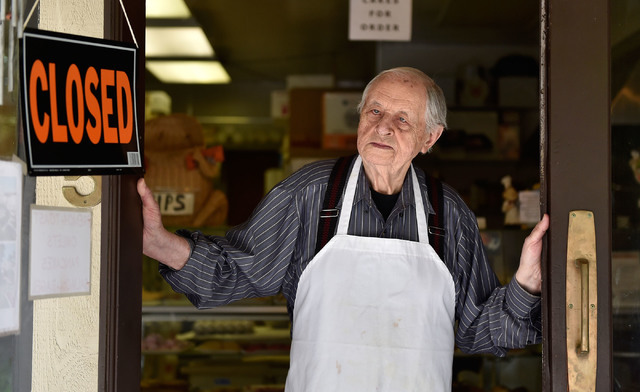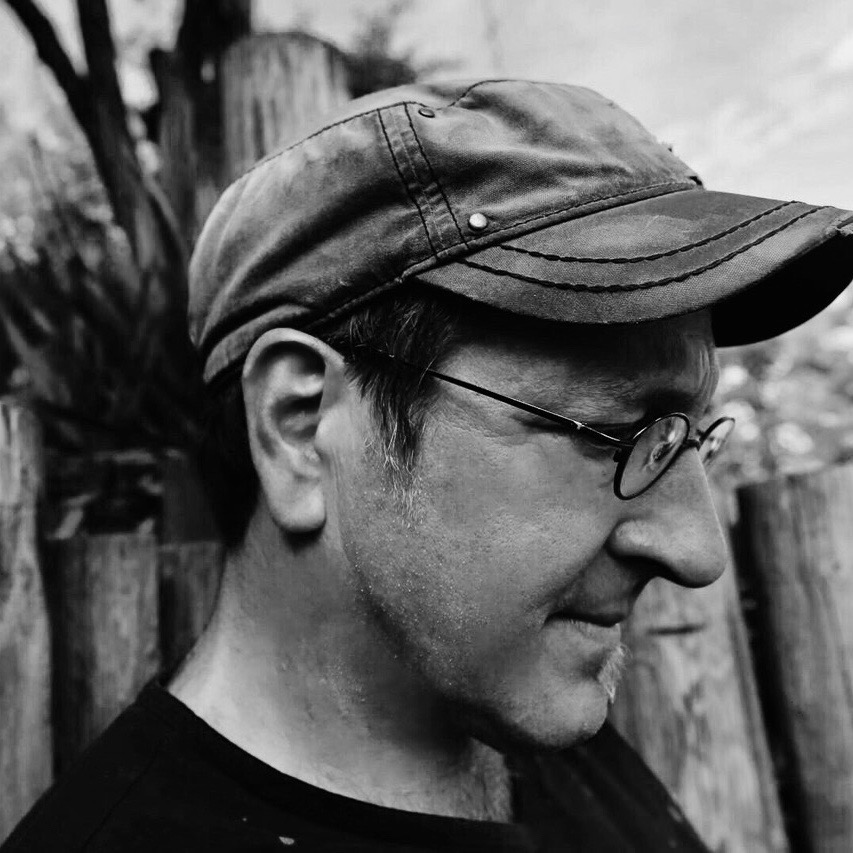 Ernie Feld Photo by David Becker
Ernie Feld Photo by David Becker Marianne Ehrenfeld remembers the frantic call from her father-in-law.
Speaking in his colorful European lilt, Czechoslovakian-born Ernie Feld was desperate. Often maddening, always flash-tempered, the aging family patriarch and world-class pastry chef said he’d been left alone in his kitchen.
Again.
Ernie’s latest girlfriend, the last in a long line of emotionally-abused, exasperated women, had just dropped her apron and walked out the door.
Now he needed someone right away to help to run his pastry shop in the woods outside Lake Tahoe.
“Can you come?’ he asked plaintively. “Just for a week?”
As it turned out, Marianne was between restaurant managing jobs: Why not make the four-hour drive from Oakland to bail out the old man she called “Gramps”?
She ran the idea by her husband Morde.
He laughed in her face. It would, he said, be like sharing a cave with an irritable insomniac bear.
“You’re going to go help my Dad? I wouldn’t suggest it.”
“No, you’re wrong,” she answered. “I can handle Ernie.”
Morde smirked.
“You won’t last a day there.”
He had a point, of course, and Marianne knew it.
This, after all, was hot-headed Ernie Feld, whose sheer willpower and exquisite baking skills helped him survive as a Nazis prisoner-of-war as his beloved mother Sarah and younger brother Alex, died in the gas chambers at Auschwitz.
Working under the threat of death, Ernie had made his delicacies for the demanding German SS officers who ran an airport camp outside Budapest. He used discarded champagne bottles to spread the dough for his signature poppy-seed strudels.
Arrogant and calculating, he eventually escaping the Germans and later became a post-war freedom fighter striving to help create an independent Jewish state. En route to the Middle East, his boatload of displaced war survivors was captured by the British. Ernie and the others then spent two years at an internment camp In Cypress.
To Marianne, her father-in-law was a crusty, dough-kneading Forrest Gump who’d somehow managed to find his way into history.
Speaking seven languages, he became a frontline witness to the mid-twentieth century’s major political events with little more than a rolling pin and a bad attitude.
In Cypress, the scheming baker did what he could just to survive, siphoning off food to create delicacies he told on the prison black market, consistently pulling culinary rabbits out of his dirty, wrinkled chef’s hat.
His masterpieces fed not only fellow inmates but his British captors. Later, after the war, he catered to both an Israeli and Soviet president.
But, decades later, Marianne knew, Ernie was just a bossy old man whose personality remained as rough-hewn as an old pair of boots.
And his tyrannical side surfaced most often in his own kitchen, where he brandished a brutal iron-will like a heavy skillet.
Many professional chefs are notoriously temperamental, but Ernie’s behavior often bordered on cruelty: He drove two former wives to tears — and divorce — by the way he belittled them.
He barked his orders, insisting that underlings couldn’t do anything right. He tossed out blistering personal insults for the slightest perceived offense: the way they washed a pan, greased a baking tray or powder-dusted his precious pastries.
After wives Helen and Shoshana left him, Ernie barked and bullied his way through a succession of girlfriends.
In the old days, when Ernie ran his own bakery in Oakland, Marianne would him racing around on his scooter, always dapper, his blue-green eyes practically metallic, his smile cock-sure.
Always, there was a different woman clutching tight at his waist.
She knew each relationship was doomed.
Most of the women had been imported from Israel or Eastern Europe; timid blue-collar workers with scant English skills who always knew their place: bowing to the master, silently enduring his volcanic tantrums; right or wrong, always yielding to Ernie’s will.
At Morde’s and Marianne’s pre-wedding party, Ernie threw a five-gallon tub of salad dressing against the wall in a self-induced rage at one girlfriend, covering the kitchen in ooze and silencing the guests.
When anyone criticized his kitchen etiquette, Ernie answered: “That’s the way it supposed to be. In the kitchen, the chef is the boss.”
Those women who challenged him were issued their walking papers. Like the Yugoslavian who answered his snapped orders with a sullen “Yes, commandant.”
Like the others, she was issued a plane ticket, told that her services — in the kitchen, bedroom or otherwise — were no longer required.
Ernie was like a pastry with too-little filling, far less sweet than hoped-for. But amid the arrogance and anger, Marianne knew, he did have a well-camouflaged soft spot.
She’d heard the stories.
During World War Two, Ernie had been a regular Kitchen-Schindler, once convincing Nazi officers that he needed scores of Jewish prisoners from the nearby camp as assistants — far more than he actually needed, as a way to save saving them from brutal hard labor and perhaps even death.
In the Cypress camp, he helped build a tunnel to secretly spirit many hundreds of Jewish prisoners to freedom, right under the noses of his British captors.
Decades later, Ernie still helped out the desperate.
He assisted Israeli immigrants in earning their green cards through steady work in his Oakland bakery, often writing letters of recommendation so they could land better jobs.
Ernie was, well, Ernie.
There were even occasional glimpses of a wry sense of humor.
Once, in court to change his last name, he told the judge it was just too long, and that be got done spelling E-h-r-e-n-f-e-l-d for new customers, his pastries were burned.
In Lake Tahoe, after bears broke into his bakery, he quipped to a reporter, “Those bears must be Jewish. They know there’s very good strudel there.”
Marianne also that Ernie had a gnawing weakness.
Despite the parade of women, he secretly mourned the loss of his first wife, Helen, whom Ernie had met in the Jewish resistance camps in Europe after the war.
Like the others, Helen had finally thrown up her hands and left Ernie, physically and emotionally drained from the abuse.
Even though each remarried, they kept in touch. Ernie was a regular at parties at Helen’s house and, when he was single, he consulted her about women he pursued.
“He’s tough,” Helen would say, “but he’s a good man.”
For her part, Marianne had carved out a relationship with her father-in-law based on a guarded mutual respect. For starters, she didn’t take any lip, answering back when he launched into his tirades.
Ernie respected Marianne for her pluck. While Morde rejected a career as a baker, saying he wouldn’t be caught dead working with his father, Marianne loved to cook and Ernie even asked her for recipes.
Once a while, he even gave his gruff approval to her creations.
So that day Ernie called, Marianne decided to take a risk.
She’d to go Lake Tahoe and work in that tiny kitchen, listen to Ernie’s wartime survival stories and his struggles to create his dream life life in the U.S.
Just maybe, she’d be able to finally figure out this baffling kitchen enigma.
She called Ernie back.
“I’m coming,” she said.
NEXT WEEK: Growing up in pre-Nazi Europe
John M. Glionna is a Las Vegas-based freelance writer who chronicles the American West. He’s also a former national reporter for the Los Angeles Times, based in Vegas, and served as the Seoul bureau chief on the newspaper’s foreign desk, where he covered the 2011 Japanese earthquake and tsunami and the subsequent death of North Korean strongman Kim Jong Il. He has also written extensively about California. For more on Glionna visit his website.





















 More news and opinions than at a Shabbat dinner, right in your inbox.
More news and opinions than at a Shabbat dinner, right in your inbox.